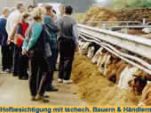Ecology & Organic TradeActual Projects & Referencies
ECO-QUALIFY I
Institute equalita has developed web-based training and European qualification standards for the further training in organic food trade in the years 2002 to 2005 in the context of the project “Eco Qualify” in the Leonardo da Vinci programme of the European union.
The qualification standards have been formulated by 14 partner organisations from 8 European countries. The partners concerned operate in various areas of the trade in organic food. Qualification standards have been developed for the operative level and for company management. Basic competences have also been formulated, as have the essential skills and knowledge in the areas of products, companies and the market. The proposed qual
International Conference on Organic Farming in Central and Eastern Europe
The conference aimed at strengthening the activism for organic farming as an agricultural alternative which respects the environment and the consumer. The work of the organic farming associations should find support in Central and Eastern Europe.
The conference presented organic farming as the most sustainable form of active environmental protection. With its positive effects on employment and as a contribution to an adequate consumer policy, it is, moreover, the most important element in the development of the rural areas.
The top-class team including many ministers and decision-makers from Central and Eastern Europe, a.o.: Renate Künast, the German minister of consumer protection, food and agriculture guaranteed positive momentum.
Organic Farming in Poland, Hungary and the Czech Republic
Insructed by the Heinrich-Böll-Stiftung, the institute´s experts have carried out trainings since 1993. Advisory service has been common practice in Poland, and since 1995 also in Hungary and the Czech Republic.
Basics of organic farming, management, organisation of work, customer orientation, marketing skills, and of controlling conditions and the EU- guidelines have been the central topics.
Joint seminars for farmers, manufacturers, wholesalers, retailers, as well as the advisors of farming associations have increased the mutual understanding of difficulties, requirements and expectations of each member of a particular field.
Educational trips to Germany provided the occasion to learn about the problems and solutions of fellow




